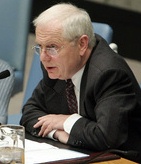 The ambassadors of China and the United States have each stated their hopes that the UNSG race will soon wrap up, but Britain reportedly is not quite ready to finalize the selection.
The ambassadors of China and the United States have each stated their hopes that the UNSG race will soon wrap up, but Britain reportedly is not quite ready to finalize the selection.
…some diplomats had wanted the next [straw poll] to include colored ballots to indicate whether the candidates get votes for or against from any of the five veto-wielding members of the council _ Britain, China, France, Russia and the United States.
However, two U.N. diplomats said Tuesday that Britain had balked at that idea during a meeting to discuss how to conduct the next poll. Both spoke on condition of anonymity because the results of the meeting were private.
One of the diplomats said Britain didn’t want the colored ballots because two of the candidates – Latvian President Vaira Vike-Freiberga and former Afghanistan finance minister Ashraf Ghani – had only just entered the race and had not been through the earlier polls. They should be extended the courtesy of a standard straw poll, the diplomat said.
U.S. Ambassador John Bolton is ready for this to be over.
…Bolton said, “We have said for some time we want to try and reach this decision by the end of September, early October, and so plenty of time has elapsed for us to go to the differentiated ballot.”
But Britain’s push back on moving on to colored-coded ballots is not simply an exercise in fairness. In addition to giving Vike-Freiberga and Ghani an opportunity to campaign, Britain could be hoping more candidates will come forward.
The other diplomat said that Britain did not want Ban to get so much support that other candidates would be dissuaded from joining the race. Britain believed that the colored ballots could do just that, the diplomat said.
Whether more candidates would come forward has been a subject of prolonged and uncertain discussion among observers. Most felt that Ban’s strong show on September 14th practically sealed it for him, and if the Qatari rumor is true, all the more so.
A source informed me yesterday that he learned this weekend that another Asian – one who has been discussed – informed his staff that he would be entering the race. The source did not want to say who this was, but it is not inconsistent with Britain’s reported hesitancy.
Another observer also suggested that the United States could have been behind entry of the most recent contenders – Zeid, Vike-Freiberga and Ghani, all from countries more favorable to U.S. global interests than their fellow candidates – in its search for a more acceptable nominee.
But can any new candidate overcome Ban’s lead? Even Shashi Tharoor, the second-place candidate in the two straw polls to date, considers Ban “the man to beat.”
“I think it’s still very early days in terms of intentions,” Tharoor said in an interview, though he added: “If (Ban) consolidates his position in the next ballot, then of course it could well be all over or close to it.”





